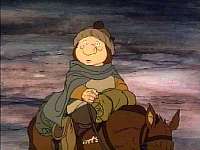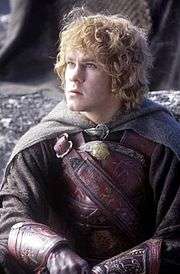Meriadoc Brandybuck
| Meriadoc Brandybuck | |
|---|---|
| Tolkien's legendarium character | |
| Aliases |
Merry, Kalimac Brandagamba, Meriadoc the Magnificent, Master of Buckland, Holdwine of the Mark |
| Race | Hobbit |
| Book(s) | The Lord of the Rings |
Meriadoc Brandybuck, usually referred to as Merry, is a fictional character from J. R. R. Tolkien's Middle-earth legendarium, featured throughout his most famous work, The Lord of the Rings.
A lover of boats and maps, Merry is described as one of the closest friends of Frodo Baggins, the main protagonist. Merry is a member of the Fellowship of the Ring.
Concept and creation
When he first appeared in Tolkien's early drafts, his name was Drogo Took. He was later renamed Vigo, and the name Drogo reassigned to Frodo's father. After that, he was renamed Marmaduke, and finally Meriadoc Brandybuck.
Family and relations
Frodo and Merry are first cousins once removed. Their common ancestors are Gorbadoc Brandybuck and Mirabella Took Brandybuck.[1]
Merry was born T.A. 2982 (or, in the Shire-reckoning, in 1382), in Buckland.[2] He is the only child of Saradoc Brandybuck (T.A. 2940-F.A. 11), who was a Master of Buckland, and Esmeralda Brandybuck (née Took) (T.A. 2936- ?), the younger sister of Paladin Took II (T.A. 2933–3034), making him first cousin to Paladin's son Peregrin Took. (See The Lord of the Rings, Appendix C.)
Merry later married Estella (Bolger) Brandybuck (T.A. 2985–?), the younger sister of Fredegar Bolger, who helped Frodo, Sam, Merry and Pippin on the first leg of their quest journey. Meriadoc and Estella had at least one son.[3]
The Fellowship hobbits' relative ages
The Council of Elrond convened on 25 October, T.A. 3018 in Rivendell.
| Character | Third Age Date of birth | Age at the Council |
|---|---|---|
| Frodo Baggins | September 22, 2968[4] | 50 |
| Samwise Gamgee | April 6, 2980[5] | 38 |
| Meriadoc Brandybuck | 2982 | 36 |
| Peregrin Took | 2990[6] | 28 |
Appearances
Literature
In The Lord of the Rings, Merry is often considered, and was described by Tolkien as, the most perceptive and intelligent of the hobbits. Even before Bilbo Baggins left the Shire, he knew of the One Ring and its power of invisibility. He guarded Bag End after Bilbo's party, protecting Frodo from the various and often unwanted guests. He is knowledgeable and has an innocent, teasing sense of humour. In one incident, Lobelia Sackville-Baggins accused Frodo of being a Brandybuck and no true Baggins. Merry assured Frodo, "It was a compliment; and so, of course, not true".
Merry was also a force behind "the Conspiracy" of Sam, Pippin, Fredegar Bolger and himself to help Frodo. Thus, at the beginning of The Fellowship of the Ring, Merry was well-prepared and organized — he assembled their packs and brought ponies. His shortcut through the Old Forest distanced them from the Nazgûl for a time, though they had to be rescued from Old Man Willow by the enigmatic Tom Bombadil. In the Barrow-downs, he acquired his sword, which was actually a dagger forged in the kingdom of Arnor.
At Bree, Merry was actually not present in the Prancing Pony when Frodo put on the Ring; instead, he was outside taking a walk, and was nearly overcome by a Nazgûl. At Rivendell, he was seen studying maps and plotting their path. He was admitted to the Fellowship only a little less reluctantly than Pippin; they were the two youngest members, and Elrond had planned on sending them back to the Shire.
At the entrance to Moria, he asked Gandalf the meaning of the door inscription "Speak, friend, and enter". When Gandalf discovered the true interpretation, he said, "Merry, of all people, was on the right track".
At Amon Hen, he was captured, along with Pippin, by a band of Saruman's Uruk-hai, although he gave a good account of himself and was valiantly defended by Boromir. Escaping with Pippin into Fangorn forest, Merry was rescued by Treebeard. Along with Pippin, he drank significant amounts of Ent-draught and grew taller, despite being a fully grown adult Hobbit. Accompanying Treebeard to the Entmoot and later to Isengard, he and Pippin took up residence in an Isengard gate-house. It was here that he first encountered King Théoden of Rohan, and was reunited with four of the remaining members of the Fellowship.
Merry was separated from Pippin after his friend beheld Sauron in the palantír and was then hastily taken to Gondor with Gandalf on Shadowfax. Merry swore fealty to Théoden and became esquire to the king. Against Théoden's orders, he rode to Gondor with Éowyn, who was disguised as a common soldier. In the Battle of the Pelennor Fields, while the Witch-king of Angmar was preoccupied with Éowyn, Merry stabbed him in the sinew behind his knee with a sword that was made by the Dúnedain of Arnor for combat against the Nazgûl. The Black Captain stumbled from Merry's stroke, and Éowyn seized the moment to strike the Captain's head, destroying him. This fulfilled the prophecy, as he was not killed "by the hand of man," but rather by a hobbit and a woman. Merry heard Théoden's last words, but went unnoticed by the honour escort of Riders; Pippin found him wandering in the city. Aragorn healed him and he recovered fully, more quickly than Éowyn.
For his bravery in battle, Merry was knighted by King Éomer as a Knight of the Mark. During the scouring of the Shire, he led the hobbits in the Battle of Bywater, and personally killed the leader of the opposing forces.
Upon his return, he and Pippin were clearly seen to be the tallest of hobbits, taller even than the legendary Bullroarer Took (as Sam said at the Field of Cormallen, Merry was three inches taller than he ought to have been). Merry went on to marry Estella Bolger sometime after the end of the Third Age. He inherited the title Master of Buckland in year 11 of the Fourth Age. He retained his links with Rohan and became an expert in Rohan's language and traditions, which he discovered, to his surprise, to have close affinity to the early history of the hobbits, and was best known in the Shire for composing Herblore of the Shire, Reckoning of Years, and Old Words and Names in the Shire.[7] Although he is not recorded as having any children within the family trees, he is noted as having at least one son.
In F.A. 64, at the age of 102, Merry returned to Rohan and Gondor with Pippin; the two hobbits died in Gondor several years later. They were laid to rest among the Kings of Gondor in Rath Dínen, then moved to lie next to Aragorn after he died in F.A. 120.
Weapons and attire
Merry was unarmed (except for a small pocket-knife) until the encounter with the barrow-wights. The hobbits were given several long Dúnedain daggers by Tom Bombadil, who found them in the wight's treasure. These served as short-swords for the hobbits, and Merry used his to stab the Witch-king in the back of the knee at the Battle of the Pelennor Fields, which destroyed the blade.
At the beginning of The Fellowship of the Ring, Merry was dressed in typical Hobbit attire: knee breeches, jacket, waistcoat and cloak. After being waylaid by the barrow-wights, he lost his lighter, summer-weight clothes and was left in a burial shift. He was forced to wear heavier woolen clothing packed on his pony the rest of the way to Rivendell. Later, he was presented an Elven cloak in Lothlórien, which gave him an ability to blend into natural surroundings. Merry offered his services to Théoden, King of Rohan, and was equipped with mail, a light leather helmet and a small green shield with a white horse emblem. He also received the horn of Rohan from Éowyn.
Upon returning to the Shire, Merry was described as wearing chain-mail. Later, he and his friend Pippin Took were known to ride about the Shire dressed in their Lothlórien cloaks with distinctive leaf-shaped clasps.
Adaptations

In Ralph Bakshi's 1978 animated version of The Lord of the Rings, Merry was voiced by Simon Chandler. In the live-action recordings Bakshi used for rotoscoping, Billy Barty was the model for several of the hobbits, but it is not clear whether Barty modelled for Merry.
In the 1980 animated version of The Return of the King, made for television, the character was voiced by radio personality Casey Kasem, who is also known for voicing the character of Shaggy in Scooby-Doo.
In the 1981 BBC radio serial of The Lord of the Rings, Merry was played by Richard O'Callaghan.
He was portrayed by Jarmo Hyttinen in the 1993 Finnish miniseries Hobitit.
In Peter Jackson's 2001-2003 film trilogy adaptation of the books, Merry was portrayed by Dominic Monaghan. In Jackson's The Lord of the Rings: The Return of the King Merry accompanied the army of the West to the Black Gate, while in the book he remained in Minas Tirith to heal from the wound he received when assisting in the killing of the Witch-king of Angmar and was instrumental in the romance between Faramir and Éowyn.
Names and titles
In the prefaces and appendices to The Lord of the Rings, Tolkien employed the conceit that he was the modern translator of a unique manuscript, the Red Book of Westmarch, and that his stories of Middle-earth derived from that. In this guise of translator, he maintained that the character's real name was not Meriadoc Brandybuck but rather Kalimac Brandagamba. This was said to be an actual phonetic transcription of the name in Tolkien's invented language of Westron, which Tolkien said he transliterated to English as follows: The nickname "Merry" represents his actual nickname Kali which meant "handsome, happy", and "Meriadoc" serves as a plausible name from which a nickname meaning "happy" could be derived.[8] Alternately, The Middle-Earth Encyclopedia writes that Meriadoc means "joyful" or "cheerful," while Merry means "having high spirits."[3]
Théoden called Merry Holdwine, and the Hobbit was thus known as such in the records of Rohan. It most probably derives from the Old English words hold and wine, respectively meaning "faithful" and "friend".[9] Tolkien used Old English to represent Rohirric, another of his fictional languages, so Holdwine, like Meriadoc Brandybuck, is not what the character was actually called. Tolkien does not give Merry's real Rohirric name.
It has been asserted that the name Meriadoc could be in itself an allusion to the British nobleman Conan Meriadoc, legendary founder of the House of Rohan in Brittany,[10] since the character Meriadoc is closely associated with Tolkien's kingdom of Rohan.
See also
Notes
- ↑ Josselyn (September 20, 2013). "Frodo's Family Tree". Frodo Forever. Retrieved January 5, 2015.
- ↑ "Meriadoc Brandybuck". Tolkien Gateway. Retrieved January 5, 2015.
- 1 2 "Meriadoc Brandybuck". The Middle-Earth Encyclopedia. 2010. Retrieved January 5, 2015.
- ↑ "Frodo Baggins". The Middle-Earth Encyclopedia. 2010. Retrieved January 5, 2015.
- ↑ "Samwise Gamgee". The Middle-Earth Encyclopedia. 2010. Retrieved January 5, 2015.
- ↑ "Peregrin Took". The Middle-Earth Encyclopedia. 2010. Retrieved January 5, 2015.
- ↑ Tolkien, J. R. R. (1954), The Fellowship of the Ring, The Lord of the Rings, Boston: Houghton Mifflin (published 1987), Prologue, "Note on the Shire Records", ISBN 0-395-08254-4.
- ↑ For the derivation of Brandybuck from "Brandagamba", see here.
- ↑ The Encyclopedia of Arda, "Holdwine"
- ↑ Friesian.com
External links
- "Meriadoc Brandybuck". Tolkien Gateway.
